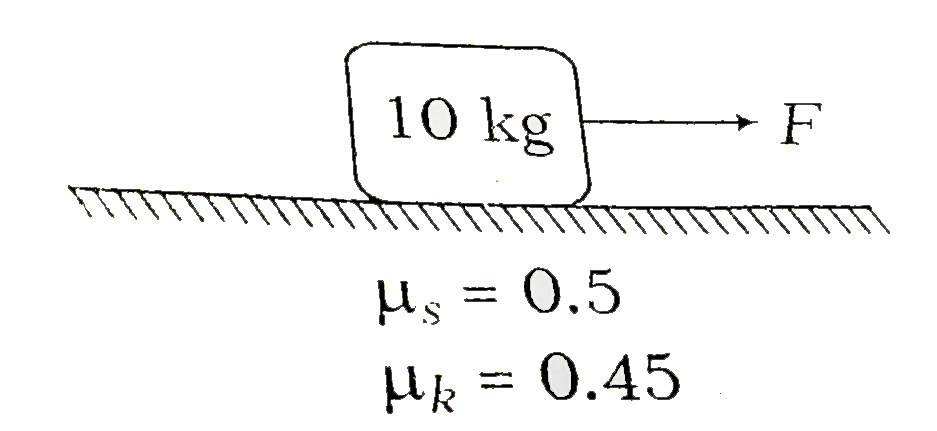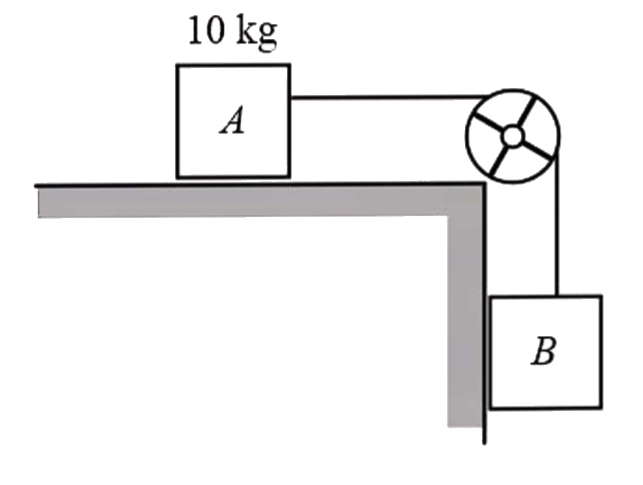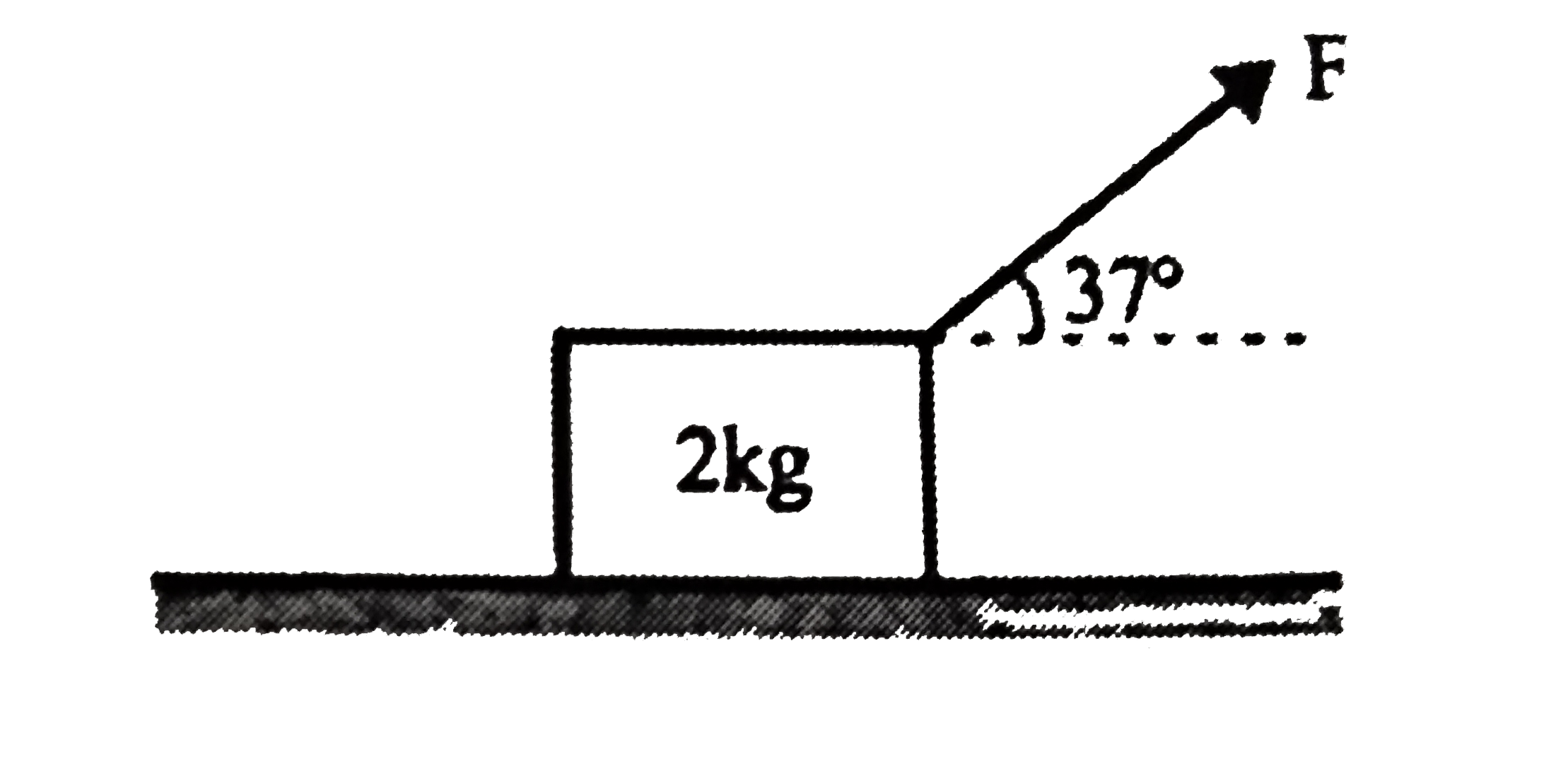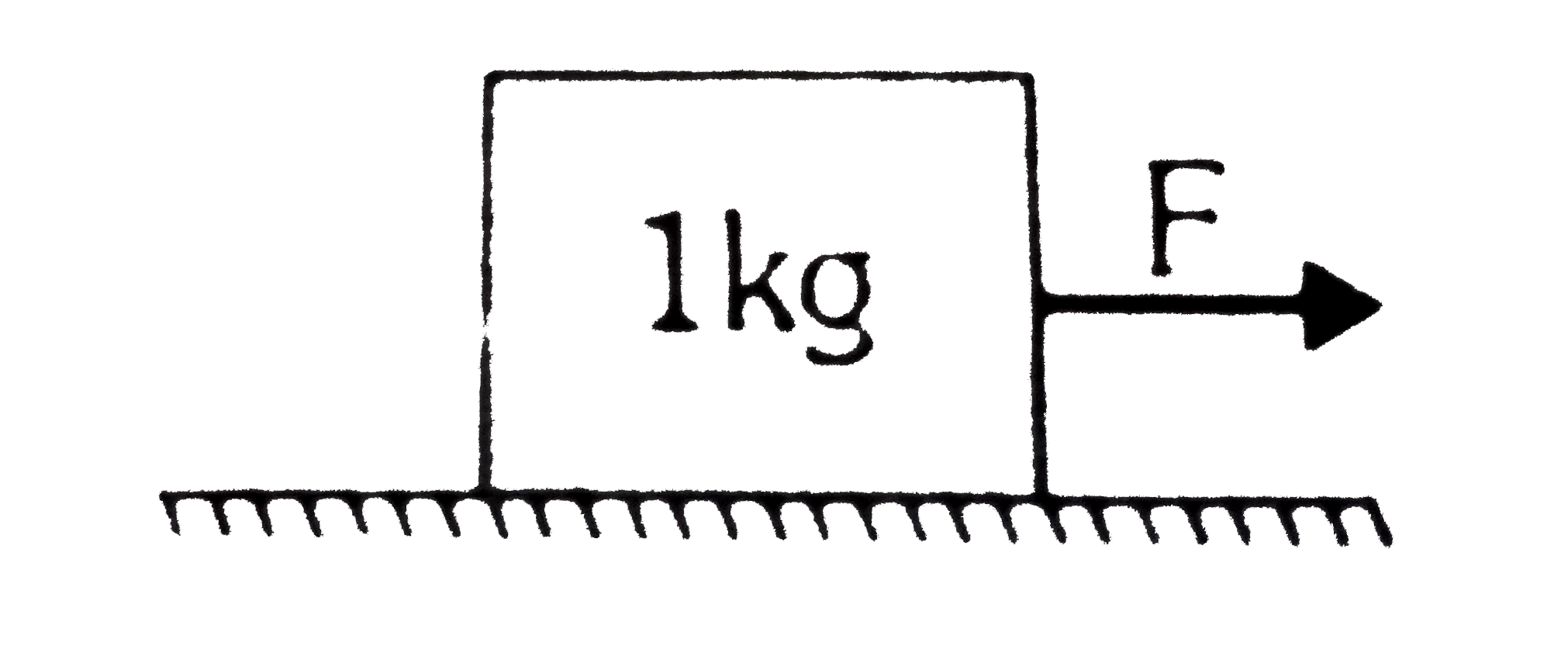A box of mass 200 kg is kept on a rough horizontal floor having coefficient of static friction μs=0.25 and coefficient kinetic friction μk=0.2. Find the work done by a man to slide the body slowly through 20 m with a minimum force. Also find the magnitude of the minimum force.
To solve the problem, we need to find the work done by a man to slide a box of mass 200 kg through a distance of 20 m on a rough horizontal floor, along with the magnitude of the minimum force required.
1. Identify the Given Data:
- Mass of the box, m=200kg
- Coefficient of static friction, μs=0.25
- Coefficient of kinetic friction, μk=0.2
- Distance to slide, s=20m
- Acceleration due to gravity, g=9.81m/s2 (we can approximate it to 10m/s2 for simplicity)
2. Calculate the Normal Force (N):
Since the box is on a horizontal surface, the normal force N is equal to the weight of the box.
N=m⋅g=200kg⋅10m/s2=2000N
3. Calculate the Frictional Force (F_f):
The frictional force can be calculated using the coefficient of kinetic friction:
Ff=μk⋅N=0.2⋅2000N=400N
4. Determine the Minimum Force (F):
To slide the box slowly, the applied force F must equal the frictional force. Therefore, the minimum force required to overcome friction is:
F=Ff=400N
5. Calculate the Work Done (W):
The work done by the man in sliding the box through a distance s against the frictional force is given by:
W=Ff⋅s=400N⋅20m=8000J
Final Answers:
- Magnitude of the Minimum Force: F=400N
- Work Done by the Man: W=8000J
- Mass of the box, m=200kg
- Coefficient of static friction, μs=0.25
- Coefficient of kinetic friction, μk=0.2
- Distance to slide, s=20m
- Acceleration due to gravity, g=9.81m/s2 (we can approximate it to 10m/s2 for simplicity)
Since the box is on a horizontal surface, the normal force N is equal to the weight of the box.
N=m⋅g=200kg⋅10m/s2=2000N
The frictional force can be calculated using the coefficient of kinetic friction:
Ff=μk⋅N=0.2⋅2000N=400N
To slide the box slowly, the applied force F must equal the frictional force. Therefore, the minimum force required to overcome friction is:
F=Ff=400N
The work done by the man in sliding the box through a distance s against the frictional force is given by:
W=Ff⋅s=400N⋅20m=8000J
- Magnitude of the Minimum Force: F=400N
- Work Done by the Man: W=8000J
Topper's Solved these Questions
- WORK, ENERGY AND POWERBOOK - AAKASH INSTITUTE ENGLISHCHAPTER - WORK, ENERGY AND POWEREXERCISE - SECTION-J (AAKASH CHALLENGERS QUESTIONS)
14 Videos
- WORK, ENERGY AND POWERBOOK - AAKASH INSTITUTE ENGLISHCHAPTER - WORK, ENERGY AND POWEREXERCISE - EXERCISE
37 Videos
- WORK, ENERGY AND POWERBOOK - AAKASH INSTITUTE ENGLISHCHAPTER - WORK, ENERGY AND POWEREXERCISE - SECTION-H (MULTIPLE TRUE FALSE TYPE QUESTIONS)
10 Videos
- WAVESBOOK - AAKASH INSTITUTE ENGLISHCHAPTER - WAVESEXERCISE - ASSIGNMENT ( SECTION-D ( Assertion - Reason Type Questions ))
12 Videos
Similar Questions
A body of mass 10 kg is kept on a horizontal floor of coefficent of static friction μs=0.5 and coefficient of kinetic friction μk=0.45 as shown in figure.

Find the acceleration, force of friction and contact force on the body by the plane when the driving force is (g=10ms−2)
(i) 40 N (ii)60N
View SolutionIf the mass of A=10 kg, coefficient of static friction=0.22, coefficient of kinetic friction=0.2, then minimum mass of B to start motion is

View Solution
Knowledge Check
A block of mass 10kg is placed on a rough horizontal surface having coefficient of friction μ=0.5 . If a horizontal force of 100N is acting on it, then acceleration of the block will be.
A10ms−2B5ms−2C15ms−2D0.5ms−2
If the mass of A=10 kg, coefficient of static friction=0.22, coefficient of kinetic friction=0.2, then minimum mass of B to start motion is

View SolutionA body of mass 2kg is kept on a rough horizontal surface as shown in the figure. If coefficient of friction is 0.5, find the work done by frictional force in the interval t=0 to t=5sec

View SolutionA block of mass 2 kg is kept on a rough horizontal floor an pulled with a force F. If the coefficient of friction is 0.5. then the minimum force required to move the block is :-

View SolutionA block of mass 10kg is placed on a rough horizontal surface having coefficient of friction μ=0.5 . If a horizontal force of 100N is acting on it, then acceleration of the will be.
View SolutionA block of mass 10kg is placed on a rough horizontal surface having coefficient of friction μ=0.5 . If a horizontal force of 100N is acting on it, then acceleration of the will be.
View SolutionA block of mass 1kg is at rest on a rough horizontal surface having coefficient of static friction 0.2 and kinetic friciton 0.15, find the frictional forces if a horizontal force,
(a) F=1N (b) F=1.96N (c) F=2.5N is applied on a block

View SolutionA block of mass 10kg is placed on a rough horizontal surface having coefficient of friction μ=0.5 . If a horizontal force of 100N is acting on it, then acceleration of the block will be.
View Solution
